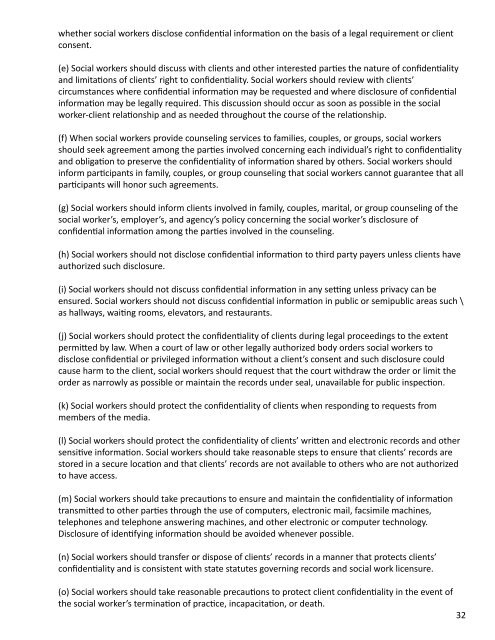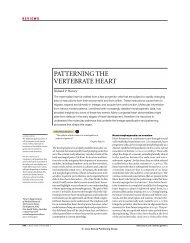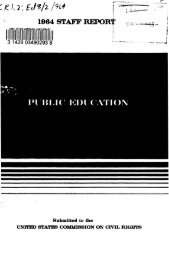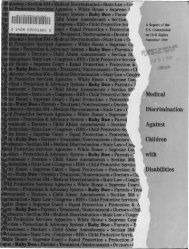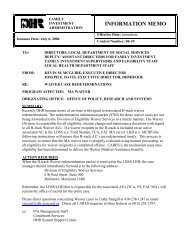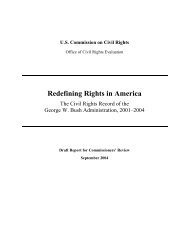Field Manual for 2013-2014 - University of Maryland School of ...
Field Manual for 2013-2014 - University of Maryland School of ...
Field Manual for 2013-2014 - University of Maryland School of ...
Create successful ePaper yourself
Turn your PDF publications into a flip-book with our unique Google optimized e-Paper software.
whether social workers disclose confidential in<strong>for</strong>mation on the basis <strong>of</strong> a legal requirement or client<br />
consent.<br />
(e) Social workers should discuss with clients and other interested parties the nature <strong>of</strong> confidentiality<br />
and limitations <strong>of</strong> clients’ right to confidentiality. Social workers should review with clients’<br />
circumstances where confidential in<strong>for</strong>mation may be requested and where disclosure <strong>of</strong> confidential<br />
in<strong>for</strong>mation may be legally required. This discussion should occur as soon as possible in the social<br />
worker-client relationship and as needed throughout the course <strong>of</strong> the relationship.<br />
(f) When social workers provide counseling services to families, couples, or groups, social workers<br />
should seek agreement among the parties involved concerning each individual’s right to confidentiality<br />
and obligation to preserve the confidentiality <strong>of</strong> in<strong>for</strong>mation shared by others. Social workers should<br />
in<strong>for</strong>m participants in family, couples, or group counseling that social workers cannot guarantee that all<br />
participants will honor such agreements.<br />
(g) Social workers should in<strong>for</strong>m clients involved in family, couples, marital, or group counseling <strong>of</strong> the<br />
social worker’s, employer’s, and agency’s policy concerning the social worker’s disclosure <strong>of</strong><br />
confidential in<strong>for</strong>mation among the parties involved in the counseling.<br />
(h) Social workers should not disclose confidential in<strong>for</strong>mation to third party payers unless clients have<br />
authorized such disclosure.<br />
(i) Social workers should not discuss confidential in<strong>for</strong>mation in any setting unless privacy can be<br />
ensured. Social workers should not discuss confidential in<strong>for</strong>mation in public or semipublic areas such \<br />
as hallways, waiting rooms, elevators, and restaurants.<br />
(j) Social workers should protect the confidentiality <strong>of</strong> clients during legal proceedings to the extent<br />
permitted by law. When a court <strong>of</strong> law or other legally authorized body orders social workers to<br />
disclose confidential or privileged in<strong>for</strong>mation without a client’s consent and such disclosure could<br />
cause harm to the client, social workers should request that the court withdraw the order or limit the<br />
order as narrowly as possible or maintain the records under seal, unavailable <strong>for</strong> public inspection.<br />
(k) Social workers should protect the confidentiality <strong>of</strong> clients when responding to requests from<br />
members <strong>of</strong> the media.<br />
(l) Social workers should protect the confidentiality <strong>of</strong> clients’ written and electronic records and other<br />
sensitive in<strong>for</strong>mation. Social workers should take reasonable steps to ensure that clients’ records are<br />
stored in a secure location and that clients’ records are not available to others who are not authorized<br />
to have access.<br />
(m) Social workers should take precautions to ensure and maintain the confidentiality <strong>of</strong> in<strong>for</strong>mation<br />
transmitted to other parties through the use <strong>of</strong> computers, electronic mail, facsimile machines,<br />
telephones and telephone answering machines, and other electronic or computer technology.<br />
Disclosure <strong>of</strong> identifying in<strong>for</strong>mation should be avoided whenever possible.<br />
(n) Social workers should transfer or dispose <strong>of</strong> clients’ records in a manner that protects clients’<br />
confidentiality and is consistent with state statutes governing records and social work licensure.<br />
(o) Social workers should take reasonable precautions to protect client confidentiality in the event <strong>of</strong><br />
the social worker’s termination <strong>of</strong> practice, incapacitation, or death.<br />
32


